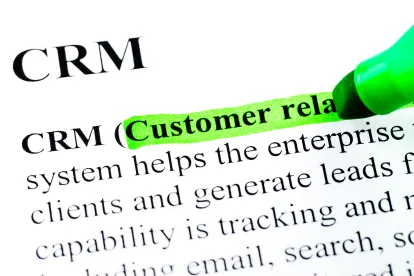CRM (Customer Relationship Management) systems have proven to be pivotal tools for numerous industries, and the legal sector is no exception. As law firms ramp up their marketing initiatives this September, it’s crucial to understand how a robust CRM system, bolstered by high-quality data, can elevate their marketing efforts.
Importance of CRM in Legal Marketing
- Streamlined Client Interactions: A comprehensive CRM system captures every interaction, such as calls, emails or meetings, ensuring lawyers and their teams remain informed and can tailor their approach to individual client needs.
- Targeted Marketing Campaigns: By leveraging client and prospect data from CRM, law firms can create segmented marketing campaigns. For instance, a campaign targeted at clients seeking real estate legal advice in the fall can be distinctly different from one aimed at businesses looking for corporate legal services.
- Referral Tracking: Many lawyers acquire new clients through referrals. With a CRM, it’s easier to track which referrals come from where, enabling firms to focus their marketing efforts and appreciation on their most valuable networks.
Data Quality: The Bedrock of Effective CRM
For a CRM system to be effective, the quality of the data fed into it is paramount. Here’s why data quality is critical:
- Accuracy and Relevance: Ensuring that client data is accurate is vital. Incorrect contact details can lead to missed opportunities, while outdated information can render marketing campaigns ineffective.
- Enhanced Decision Making: Quality data enables law firms to clean actionable insights, from understanding which services are most sought after, to identifying the most influential referral sources.
- Personalization: In the age of digital marketing, personalization is key. Accurate and up-to-date data ensures that marketing campaigns resonate with their intended audiences. For instance, recognizing that a client has recently started a family business can lead to tailored communications about legalities related to family enterprises.
Integrating CRM and Data Quality into September Strategies
Incorporating CRM insights can refine each of the September marketing strategies mentioned above by:
- September Starter Webinar or Workshop: Use CRM data to identify topics that have been frequently discussed or queried by clients over the past months. This way, you can create content that directly addresses the pressing needs and concerns of your clients. Consider sending out pre-webinar surveys, leveraging CRM to select potential attendees and tailoring your content accordingly. By aligning your webinar or workshop topics with real-time data, you not only ensure relevancy but also boost engagement rates.
- Participate in Local September Festivities: Identify and reach out to potential clients or networks using CRM segmentation. By understanding the demographics, interests and preferences stored in your CRM, you can choose festivities that will best resonate with your target audience. Ensure your presence at these events is optimized for the clients you aim to serve.
- September Synopsis Newsletter: Include an item addressing common questions or issues stored in the CRM. This is a great way to demonstrate that you’re actively listening to your clients. Personalize the newsletter based on the data segments. For instance, for corporate clients, provide insights into upcoming legal changes that could impact their businesses. This proactive approach, fueled by CRM insights, establishes you as a thought leader in your domain.
- Strategize Ahead: Use CRM analytics to predict future client needs and craft early bird offers accordingly. By analyzing historical data and trends from previous years, you can anticipate client requirements in the coming months. Perhaps there’s a seasonal surge in certain legal queries around winter. Offer discounted packages or consultations related to those specific services. This preemptive approach positions your firm as both insightful and client centric.
- Revitalize Your Digital Footprint: Embed CRM feedback or client testimonials to make your website and social media more authentic and relatable. Positive feedback and testimonials can serve as powerful trust signals for potential clients. If, for instance, a client praised your swift response time or detailed consultation in the CRM feedback, highlight such commendations on your homepage or in your social media campaigns. By incorporating real client experiences, you humanize your brand and reinforce your credibility.
- Forge Ties with Autumn-centric Businesses: Use CRM to identify businesses that are active during the fall and approach them for collaborations. By understanding which businesses peak during the autumnal months through CRM analytics, you can offer specialized legal packages or workshops tailored for them.
By deepening the integration of CRM insights into these strategies, legal professionals can craft more intuitive, targeted and successful marketing initiatives for the seasonal shift. With a focus on data quality, law firms can ensure that their marketing strategies are not only timely but also personalized, efficient and effective.




 />i
/>i

